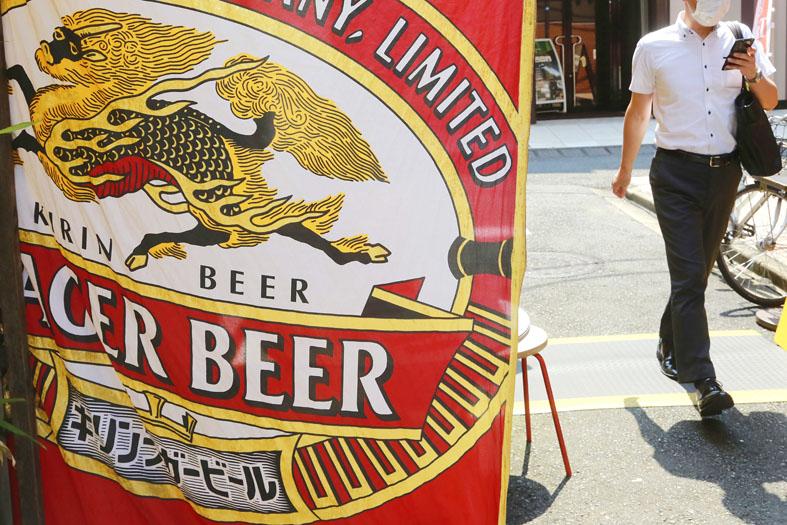Kirin Holdings Co is selling its China soft drinks joint venture to an investment fund, the Japanese beer and beverage maker said yesterday.
The move comes shortly after Kirin decided to pull out of a joint venture brewery in Myanmar.
PORTFOLIO REVIEW

Photo: AP
The sale to Plateau Consumer, a Chinese fund, for ¥115 billion (US$994.56 million) covers Kirin’s entire 40 percent stake in China Resources Kirin Beverages Co (華潤麒麟飲料), Tokyo-based Kirin said in a statement.
The joint venture, established in 2011, had been expanding its business in China, making bottled water and bottled tea, Kirin said
Kirin said the move was part of its recent decision to review its investment portfolio, including foreign operations, under a management plan that runs through 2024.
NEW DIRECTION
The plan has the company focusing on certain areas, including pharmaceuticals and health science, as well as food and beverages.
More recently, Kirin has been trying to streamline its sprawling operations to focus on projects such as developing drugs for diseases that have no existing treatments, and working on what Kirin calls LC-Plasma to offer health products that help maintain immune systems.
Kirin is among Japan’s top beer brands, but beer companies there have expanded into other kinds of beverages.
It still has various global operations, including Four Roses Distillery in the US and San Miguel Brewery Inc in the Philippines.

Taiwan Semiconductor Manufacturing Co (TSMC, 台積電) yesterday said that its investment plan in Arizona is going according to schedule, following a local media report claiming that the company is planning to break ground on its third wafer fab in the US in June. In a statement, TSMC said it does not comment on market speculation, but that its investments in Arizona are proceeding well. TSMC is investing more than US$65 billion in Arizona to build three advanced wafer fabs. The first one has started production using the 4-nanometer (nm) process, while the second one would start mass production using the

A TAIWAN DEAL: TSMC is in early talks to fully operate Intel’s US semiconductor factories in a deal first raised by Trump officials, but Intel’s interest is uncertain Broadcom Inc has had informal talks with its advisers about making a bid for Intel Corp’s chip-design and marketing business, the Wall Street Journal reported, citing people familiar with the matter. Nothing has been submitted to Intel and Broadcom could decide not to pursue a deal, according to the Journal. Bloomberg News earlier reported that Taiwan Semiconductor Manufacturing Co (TSMC, 台積電) is in early talks for a controlling stake in Intel’s factories at the request of officials at US President Donald Trump’s administration, as the president looks to boost US manufacturing and maintain the country’s leadership in critical technologies. Trump officials raised the

‘SILVER LINING’: Although the news caused TSMC to fall on the local market, an analyst said that as tariffs are not set to go into effect until April, there is still time for negotiations US President Donald Trump on Tuesday said that he would likely impose tariffs on semiconductor, automobile and pharmaceutical imports of about 25 percent, with an announcement coming as soon as April 2 in a move that would represent a dramatic widening of the US leader’s trade war. “I probably will tell you that on April 2, but it’ll be in the neighborhood of 25 percent,” Trump told reporters at his Mar-a-Lago club when asked about his plan for auto tariffs. Asked about similar levies on pharmaceutical drugs and semiconductors, the president said that “it’ll be 25 percent and higher, and it’ll

CHIP BOOM: Revenue for the semiconductor industry is set to reach US$1 trillion by 2032, opening up opportunities for the chip pacakging and testing company, it said ASE Technology Holding Co (日月光投控), the world’s largest provider of outsourced semiconductor assembly and test (OSAT) services, yesterday launched a new advanced manufacturing facility in Penang, Malaysia, aiming to meet growing demand for emerging technologies such as generative artificial intelligence (AI) applications. The US$300 million facility is a critical step in expanding ASE’s global footprint, offering an alternative for customers from the US, Europe, Japan, South Korea and China to assemble and test chips outside of Taiwan amid efforts to diversify supply chains. The plant, the company’s fifth in Malaysia, is part of a strategic expansion plan that would more than triple